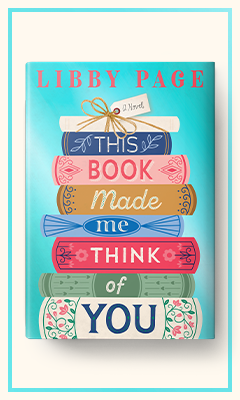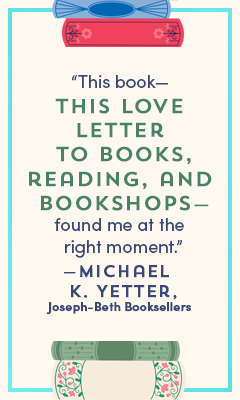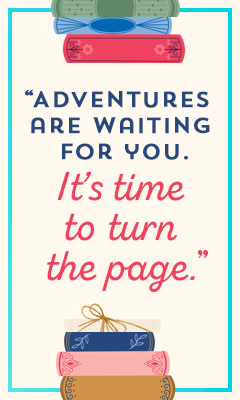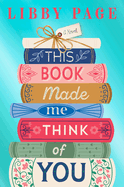This Book Made Me Think of You
by Libby Page
Libby Page's sixth novel, This Book Made Me Think of You, is a gift that keeps on giving. Through her insightful exploration of the many facets of grief, she offers hope without negating what it means to live with unfathomable loss. Along the way, she includes a diverse and meaningful list of literary companions for any journey, but especially one through challenging times.
Tilly Nightingale stopped reading when her husband, Joe Carter, was diagnosed with cancer. Tilly, who grew up in Hay-on-Wye, where "every shop... [is] a bookshop," works as an editor. She met Joe in the Foyles bookshop on Charing Cross Road; he nicknamed her Library Mouse (after the Italian term for bookworm, "topo di biblioteca"). For her to lose interest in books clearly signals a deeper sense of desolation. The novel opens six months after Joe's death, when Alfie Lane, manager of Book Lane bookshop in central London, phones Tilly on January 5--her birthday--to tell her he has a book for her from one Joe Carter. She thinks it's a mistake; he asks her to come in so he can explain.
Thus begins a year-long odyssey for Tilly, through Joe's gift of a book per month for the entire year. This at first draws her back into her love of reading, then gets her cooking, running, and traveling, to Bali, Paris, and Tuscany. Page cleverly structures the book so that Alfie kicks off each month with a thematic list of titles that "Book Lane Recommends," with Tilly's book from Joe sparking the theme.
As the months go on, a friendship grows between Tilly and Alfie. While other people disappear, or try to "help," or don't know what to say, Alfie always has a kind word. "I'm so sorry for your loss," Alfie tells Tilly that fifth day of January, "Not that those words mean much, do they?... But it's hard to come up with an alternative, isn't it? I make my living out of words and I still haven't come up with anything better." Alfie, too, has had his share of loss. And together they enjoy an honest rapport about books, people, and life.
A standout section involves the book Wild Camping, with Tilly enlisting Alfie to help her on a dry run of setting up a tent in a nearby park. The episode affirms Tilly's friendship with Alfie and the lengths she will go to in honoring Joe's gift to (and faith in) her. It also encapsulates a catharsis in her longtime but fragile friendship with ghostwriter Rachel, who disappeared from Tilly's life when Joe was diagnosed, and has recently re-entered it due to a work project. The camping preparations and execution bring into focus just how much Tilly's world has expanded since the early days of her grief, when she barely left the home she shared with Joe, and her sister, Harper, would bring her takeout.
Page insightfully depicts Tilly's journey through grief as two steps forward, one step back. She takes risks, then doubts herself. Begins to trust, then fears the worst. While such experiences are universal, they can feel insurmountable when also swimming through grief. She contends with her sister's misfired attempts to help her "move on," her mixed feelings about Joe's mother, and the resentment she feels toward Rachel, while at the same time seeing Book Lane as a new safe harbor for her.
With a light touch and deep insight, Page exposes the varied ways people experience tremendous heartache, not only Tilly, Alfie, and Joe's mother, who all grieve, but also via the reactions of others to grief, and how hurtful (even unintentionally) they can be. There are wonderful moments, too, such as Tilly meeting the supportive "Paris Grief Gang" (in a roundabout way, through the original Shakespeare & Co. and A Moveable Feast). And Constanza, Tilly's cooking instructor in Tuscany, who tells Tilly she still grieves her husband's death 10 years ago: "My grief is un regalo--a gift. He gave it to me. It is our memories. Our love. I don't want to put it down. I carry it gently."
This Book Made Me Think of You is an eloquent and passionate ode to book lovers, book shops, and booksellers, just right for that person who always has a book in their tote and on their nightstand. It's a novel about how books change people's lives. And it is a book that offers hope to those who've experienced great loss. Tilly doesn't conquer her grief; she learns how to live with it, to honor Joe, and to nurture herself. Her commitment to commemorate their life together leads her to become more self-sufficient and to take risks by experiencing new things, to face her fears and learn that joy can coexist with pain and sorrow. --Jennifer M. Brown








